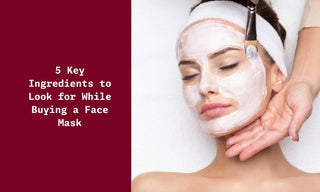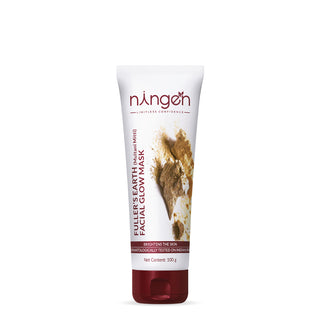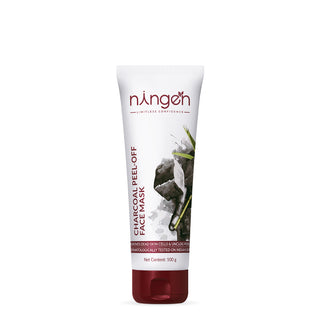Choosing the right face mask can feel overwhelming with so many options available, but knowing the key ingredients to look for can make all the difference. Whether you're targeting acne, dullness, dryness, or simply want a refreshing glow, the right ingredients can transform your skin.
This article will explore 5 Key ingredients to look for while buying a face mask, along with tips on how to choose the right one for your specific needs. By understanding the unique properties of these components, you can make better choices for your skincare regimen and achieve the results you desire.
Stay tuned to discover what makes these ingredients so powerful and how they can help you achieve your skincare goals!

In This Article;
- 5 Key Ingredients for Choosing the Best Face Mask
- 1. Hyaluronic Acid: The Hydration Hero
- 2. Salicylic Acid: Your Acne-Fighting Assistant
- 3. Vitamin C: Boosting Brightness and Youthfulness
- 4. Clay: The Detoxifying Powerhouse
- 5. Aloe Vera: The Soothing Savior
- How to Select the Perfect Face Mask for Your Skin?
- 1. Oily Skin
- 2. Dry Skin
- 3. Combination Skin
- 4. Acne-Prone Skin
- 5. Sensitive Skin
- 6. Mature Skin
- 6. Mature Skin
- The Bottom Line
- TL;DR
- FAQs
5 Key Ingredients for Choosing the Best Face Mask
1. Hyaluronic Acid: The Hydration Hero
Hyaluronic acid is renowned as a hydration hero in the skincare world for its incredible ability to retain moisture, making it a vital ingredient as for maintaining skin health. It is a naturally occurring substance in the skin that attracts and holds onto water molecules, keeping the skin hydrated and plump. This active ingredient is beneficial for various skin types, including sensitive, oily, dry, and even mature skin.
One of the primary advantages of hyaluronic acid is its versatility. It works effectively for dehydrated skin, helping to maintain the skin hydrated throughout the day. It also plays a crucial role in improving skin texture and reducing the appearance of fine lines. By encouraging moisture retention, it addresses concerns like uneven skin tone and dull skin, which are common in both combination and acne-prone skin.
Incorporating hyaluronic acid into your skincare routine can yield maximum benefits, especially when used in masks such as gel masks and sheet masks. These forms are particularly effective for adding an extra layer of hydration. Whether you are dealing with dry skin or excess sebum production, hyaluronic acid can help restore balance, ensuring your skin feels smooth and healthy.
2. Salicylic Acid: Your Acne-Fighting Assistant
Salicylic acid is a beta hydroxy acid (BHA) that excels in treating acne-prone skin by penetrating deep into the pores. Its primary function is to dissolve excess sebum and clear out dead skin cells that can clog pores, making it an effective choice for tackling acne and oily skin. This key ingredient helps exfoliate the skin gently, promoting a smoother skin texture while reducing the occurrence of blemishes.
In addition to its exfoliating properties, salicylic acid is anti-inflammatory, which can help calm irritated skin and reduce redness associated with acne breakouts. It's an active ingredient found in various skincare products, including face masks, creams, and gels, specifically designed to target acne issues. For an effective skincare routine, incorporating products with salicylic acid can assist in maintaining clear and balanced skin. Remember, however, to use it in moderation, as excessive use might lead to dryness or irritation, especially in sensitive or dry skin types. As a rule of thumb, it's always best to start with lower concentrations and gradually increase as your skin builds tolerance.
3. Vitamin C: Boosting Brightness and Youthfulness
Vitamin C is a powerful antioxidant known for its role in enhancing skin brightness and promoting a youthful appearance. By neutralizing free radicals, it helps to minimize the damage caused by UV rays and environmental stressors. This reduces the appearance of fine lines, wrinkles, and dull skin, leading to a more radiant complexion.
A crucial benefit of Vitamin C is its ability to inhibit melanin production, helping to even out skin tone and reduce hyperpigmentation. It also boosts collagen production, essential for maintaining skin elasticity and firmness. Regular incorporation of Vitamin C in your skincare routine can improve skin texture and hydration, making it a valuable ingredient for individuals with mature or dull skin.
When selecting a Vitamin C product, look for stable formulations to ensure maximum efficacy. Products containing L-ascorbic acid, ascorbyl palmitate, or magnesium ascorbyl phosphate are effective choices. By integrating Vitamin C into your daily regimen, you can enjoy brighter, healthier, and more youthful-looking skin.
4. Clay: The Detoxifying Powerhouse
Clay is renowned for its detoxifying properties, making it a popular choice in skincare products. This natural ingredient has the ability to absorb impurities, excess sebum, and toxins from the skin, making it particularly beneficial for those with oily or acne-prone skin. Its mineral-rich composition also aids in improving skin texture and promoting a clearer complexion.
There are several types of clay, such as bentonite, kaolin, and French green clay, each offering unique benefits. Bentonite clay, for example, is highly effective at unclogging pores and removing dead skin cells, while kaolin clay is milder and suitable for sensitive or dry skin. These properties make clay an ideal addition to facial masks, whether in the form of cream masks, gel masks, or sheet masks.
Incorporating clay masks into your skincare routine can help maintain skin health and keep the skin hydrated without stripping it of natural oils. It's a versatile ingredient that addresses various skin concerns, including dull skin and uneven skin tone. For maximum benefits, it's generally recommended to use a clay mask once a week or as needed, based on your specific skin type and issues.
5. Aloe Vera: The Soothing Savior
Aloe Vera is widely known for its soothing and healing properties, making it an essential component in skincare routines. This succulent plant is quite rich in vitamins, minerals, and antioxidants, which contribute to its ability to repair and rejuvenate the skin. Aloe Vera is particularly effective in calming irritated skin and reducing redness, making it ideal for sensitive skin types.
Its natural anti-inflammatory properties help in treating minor burns, cuts, and sunburns, accelerating the healing process. Aloe Vera's hydrating qualities are noteworthy, as it penetrates the skin deeply, restoring moisture and maintaining skin health without leaving a greasy residue. This makes it suitable for oily skin, as it provides necessary hydration without triggering excess sebum production.
Furthermore, Aloe Vera's gentle exfoliating effect aids in removing dead skin cells, enhancing skin texture and combating dull skin. Its use in gel and cream masks can help address skin concerns like clogged pores and uneven skin tone, maximizing benefits for those with combination or mature skin. In summary, Aloe Vera is a versatile and natural skincare ingredient that can cater to various skin types and issues, enriching your daily skincare routine.
Also read: Can Face Wash Help with Anti-aging?
How to Select the Perfect Face Mask for Your Skin?
Choosing the right face mask can work wonders for the health of your facial skin, but the key lies in choosing one tailored to your specific skin type. Here’s a quick guide:
1. Oily Skin
- Best Mask: Clay or Charcoal Masks
- Why: These masks help absorb excess oil, unclog pores, and reduce shine without over-drying.
- Tip: Look for ingredients like kaolin clay or activated charcoal for a mattified look.
2. Dry Skin
- Best Mask: Hydrating or Cream Masks
- Why: They provide intense moisture and restore your skin’s natural barrier.
- Tip: Opt for masks with hyaluronic acid, glycerin, or natural oils like avocado or almond.
3. Combination Skin
- Best Mask: Multi-Masking or Balancing Masks
- Why: Multi-masking targets oily zones (T-zone) with clay masks and hydrates dry areas with cream masks.
- Tip: Select masks with gentle, balancing ingredients such as Aloe Vera or Green Tea.
4. Acne-Prone Skin
- Best Mask: Detoxifying or Anti-Bacterial Masks
- Why: They help combat bacteria, reduce inflammation, and prevent breakouts.
- Tip: Look for Face Masks with salicylic acid, bentonite clay, or tea tree oil.
5. Sensitive Skin
- Best Mask: Soothing or Calming Masks
- Why: They minimize irritation and redness while nourishing the skin.
- Tip: Choose fragrance-free options with chamomile, calendula, or oatmeal.
6. Mature Skin
- Best Mask: Anti-Aging or Firming Masks
- Why: These masks boost collagen production, improve elasticity, and reduce fine lines.
- Tip: Look for masks with retinol, peptides, or vitamin C.
Tips To Choose Face Mask:
- Always check the ingredients for avoiding allergens as well as irritants.
- Patch-test new facial masks to ensure they suit your skin.
- Use face masks 1–2 times a week to get the best results.
Also read: How to find out the right face mask for your skin?
The Bottom Line
I hope that you found this article on “5 Key Ingredients to Look for While Buying a Face Mask” helpful. Choosing the right face mask involves understanding your skin type and selecting key ingredients like hyaluronic acid for hydration, salicylic acid for acne, vitamin C for brightness, clay for detox, and aloe vera for soothing. Tailor your skincare routine with toxin-free and chemical-free face masks to address specific concerns effectively. A little extra care goes a long way in achieving healthy, glowing skin!
TL;DR
When choosing the right face mask for your skincare routine, it is crucial to take into account your individual skin type and specific concerns. Pay attention to the key ingredients that cater to your needs: hyaluronic acid is excellent for providing deep hydration, salicylic acid is effective in treating and preventing acne breakouts, vitamin C is known for its powerful brightening effects, clay is superb for detoxifying the skin, and aloe vera offers soothing and calming properties. It is advisable to select masks that are toxin-free and devoid of harsh chemicals to effectively address your skincare issues. Keep in mind that dedicating a little extra effort towards your skincare can play a significant role in achieving healthy, radiant skin. Make informed choices to truly enhance the effectiveness of your skincare routine!
FAQs
Q1. What are the best ingredients in a toxin-free face mask in India?
Look for natural ingredients like aloe vera, clay, hyaluronic acid, salicylic acid, and vitamin C to address various skin concerns while keeping your routine chemical-free.
Q2. How frequently should I use a face mask?
It’s best to use a face mask 1–2 times a week, depending on your skin type and specific needs.
Q3. Are chemical-free face masks safe for sensitive skin?
Yes, chemical-free face masks with calming ingredients like chamomile, aloe vera, and oatmeal are gentle and ideal for sensitive skin.
Q4. Can I incorporate a clay mask in my skincare routine if I have dry skin?
Yes, but pick a mild clay like kaolin & follow-up with a hydrating moisturizer in order to prevent over-drying.
Q5. What is the best face mask for acne-prone skin?
Detoxifying masks with salicylic acid, tea tree oil, or bentonite clay are excellent for acne-prone skin as they unclog pores and reduce inflammation.
Q6. How does hyaluronic acid in face masks benefit the skin?
Hyaluronic acid deeply hydrates the skin, improves texture, and reduces fine lines, making it suitable for all skin types.
Q7. Is vitamin C in face masks good for pigmentation?
Yes, vitamin C helps reduce pigmentation and uneven skin tone while boosting collagen and radiance.
Q8. What should I avoid when buying a chemical-free face mask?
Avoid masks with artificial fragrances, parabens, sulfates, and harsh chemicals that can irritate the skin.
Q9. Can I multi-task for combination skin?
Absolutely! Use a clay mask for oily areas and a hydrating or soothing mask for dry zones to balance your skin.
Q10. Are toxin-free face masks effective for anti-aging?
Yes, look for toxin-free masks with ingredients like vitamin C, peptides, and retinol to combat signs of aging and improve elasticity.










